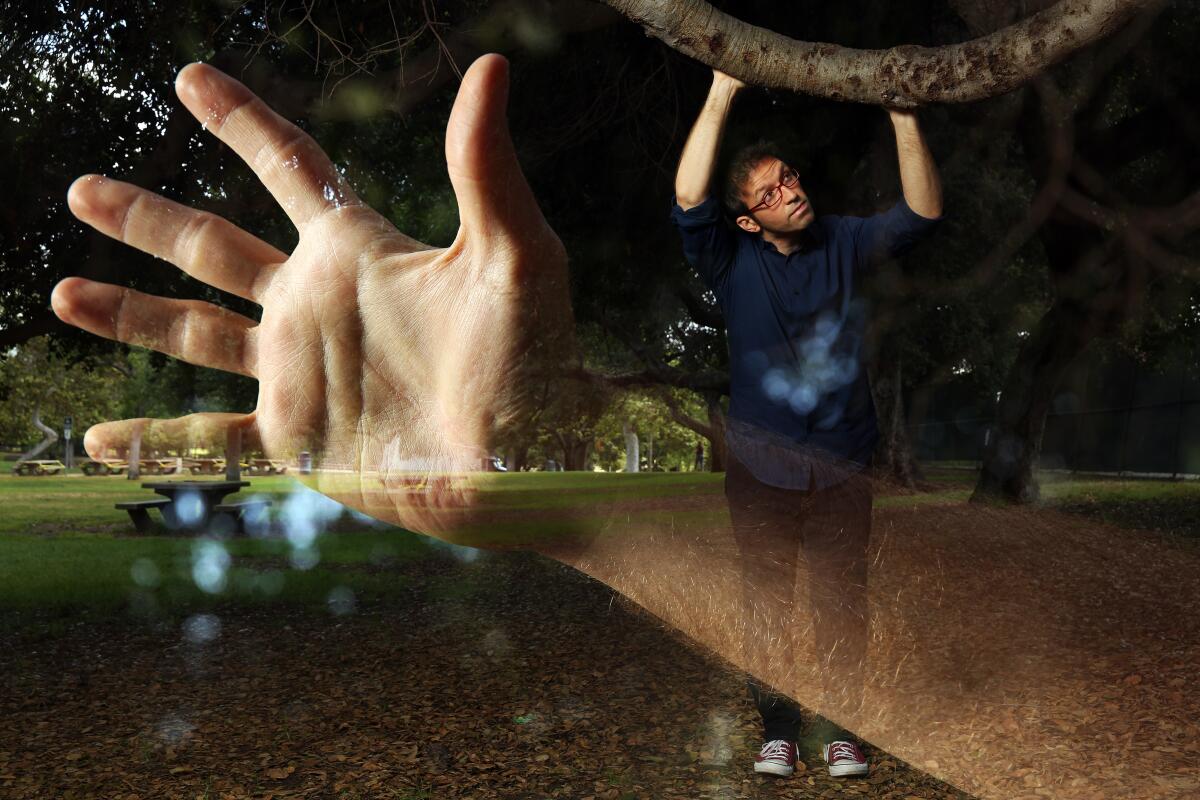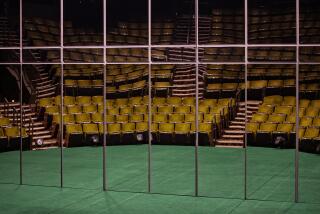Is this how theater gets saved? Geffen magic show mines virtual box-office gold

Is box-office magic even a thing during the coronavirus pandemic? It is when the show stars a sleight-of-hand master who can perform jaw-dropping tricks, erase the sense of isolation for theater-starved audiences — and sell more than 6,000 tickets for a single evening on Zoom.
The show is called “The Present,” the magician is Helder Guimarães and the theater that captured lightning in a pandemic bottle is the Geffen Playhouse, which launched its Geffen Stayhouse banner to keep audiences digitally engaged after COVID-19 closed theaters nationally.
“The Present,” which had its first performance on May 7, quickly achieved local phenom status and was extended three times. By the grand finale Saturday, Guimarães will have logged 251 sold-out shows. He has performed up to 13 times per week, and more than 70 shows have been buyouts, meaning a single group or entity bought all 25 Zoom slots for a specific performance. Famous faces have been logging on, including Laura Dern, Mark Hamill, Patton Oswalt, Billy Crystal and Laurie Metcalf.
“At the end of the day, the thing that is so satisfying is that it has kept the staff engaged, kept our audience engaged and enhanced the Geffen stage brand,” Geffen Executive Director Gil Cates Jr. said. “It’s great in terms of energy.”
When all is said and done, Cates said, “The Present” will have grossed more than $700,000, an astronomical figure for regional theaters scrambling, often blindly, to devise entertainment for a virtual audience. Cates compared that number to what a typical show in the Geffen’s 500-seat mainstage auditorium might gross during a nonpandemic five-week run — if heavily promoted and highly successful.
Tickets for “The Present” averaged $95 per household. The cost included a “mystery box,” mailed to homes before the performance, that contained props for Guimarães’ story and allowed audience members to participate in his tricks.
The grand finale Saturday, which has no audience cap, will allow people to watch (but not participate in the interactive portions of the show) for $25. With 6,000 households signed up so far, that’s $150,000 for a single performance. For an additional $15, viewers can receive a “mystery envelope” that contains a limited number of items in the mystery box.
“We’re running a wartime-level production workshop at the Geffen, rolling out boxes instead of tanks,” artistic director Matt Shakman told The Times in an interview about the transition from in-person to virtual productions back in May.
The mystery boxes — mailed to audience members in 30 countries including Denmark, Poland, Singapore and Ukraine, the Geffen said — have been key to the magic, turning a solo viewing experience into a communal interactive activity.
Guimarães performs the show from a corner of his apartment. His fiancée, Catarina Marques, operates the camera, and producer Frank Marshall of the “Jurassic Park” and “Indiana Jones” franchises directs remotely.
The show, experienced by viewers wherever they choose (Cates said one participant watched from a Jacuzzi), somehow manages to erase the social distance that has defined many people’s experience of the world during the pandemic.
Times theater critic Charles McNulty called the viewing experience “the closest approximation I’ve had to being in a theater since the pandemic closed the venues. The show contains a slew of card tricks, but the real sleight-of-hand is the transformation of digital into theatrical space.”
The success of “The Present” could be elusive to other theater companies, which may not be able to match the wizardry of Guimarães’ magic — or which may have no interest in the genre. But as McNulty pointed out, the show’s success is built on other factors too — not the least of which is the storytelling skill of Guimarães, who frames his tricks with the tale of being quarantined as a child after he was hit by a car.
It’s also key that at a time of such turmoil, the show is pure escapism. It’s fun. If Zoom screen smiles are any indication, the audience logs out happy.
“Helder is a great storyteller,” Cates said, “and he related to people about this moment we are in.”
More to Read
The biggest entertainment stories
Get our big stories about Hollywood, film, television, music, arts, culture and more right in your inbox as soon as they publish.
You may occasionally receive promotional content from the Los Angeles Times.







